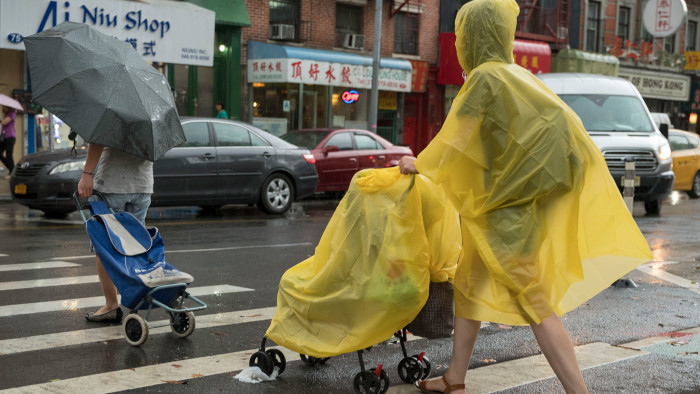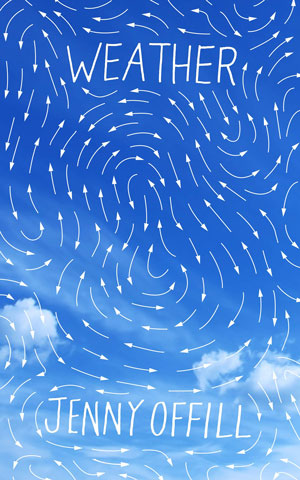Weather by Jenny Offill — thick with atmosphere, suffused with anguish

Roula Khalaf, Editor of the FT, selects her favourite stories in this weekly newsletter.
The unnamed narrator of Jenny Offill’s acclaimed 2014 novel Dept of Speculation never wanted to get married. Instead, her plan was “to be an art monster” — someone who concerns herself only with art, not with “mundane things”.
Though she succeeds in publishing a book before her 30th birthday, the mundane intervenes soon enough, in the form of a husband with a flair for DIY and a baby whose marathon crying fits subside only when she’s pushed around a harshly lit neighbourhood pharmacy in her stroller.
Offill’s trick in Dept of Speculation was to make the familiar — in this case, the novel of thwarted artistic ambition — unfamiliar. This was a very unusual kind of domestic drama, arranged as a series of semi-discrete paragraphs and fragments of varying lengths, each of which hummed with a strange self-contained energy and power of its own.
In an interview, Offill said she had sought a fresh form for that book (her 1999 debut novel Last Things was a more conventional exploration of marital turmoil), one that was influenced as much by poetry and the essay as it was by more standard fictional prose. Her new novel Weather employs the same techniques as its predecessor (in the process evincing a similarly incantatory and lapidary quality), albeit to somewhat different ends.

The effect of the radically discontinuous structure of Dept of Speculation was to create what one critic called an “undertow of anguish”. Offill said she was much less interested in plot than in the creation of a “sense of momentum, of emotional velocity”. Weather has a comparable thickness of atmosphere, though the anguish that suffuses the new book is as much public or political as it is private or personal.
Halfway through the novel, we see Lizzie, the narrator, staying up all night with her husband Ben to watch television coverage of Donald Trump’s 2016 election victory. Lizzie, a 40-ish mother of one and a librarian at the university where she’d been a graduate student, compares the atmosphere to an earlier political emergency. “It was the same after 9/11,” she says. “There was that hum in the air. Everyone was talking about the same thing. In stores, in restaurants, on the subway.”
One of Offill’s touchstones as a writer is Renata Adler’s 1976 novel Speedboat, which pioneered the kind of episodic plotlessness that she has made her own. The American writer Donald Barthelme observed that Adler’s book offered “glimpses into the special oddities and new terrors of contemporary life”. One might say the same about Weather.
As well as working in the library, Lizzie moonlights as an amanuensis for Sylvia, a former professor of hers who now hosts a wildly successful podcast that generates a mailbag more voluminous than she can cope with on her own. It has episodes with titles such as “The Center Cannot Hold”. “They could all be called that,” Lizzie remarks mordantly. “But Sylvia’s voice is almost worth the uptick in dread. It’s soothing to me, even though she talks only of the invisible horsemen galloping towards us.”
That “uptick in dread” that working for Sylvia delivers soon becomes a permanent miasma of planetary angst. When Lizzie is not meeting Silicon Valley transhumanists who hope the species will soon “shed these burdensome bodies and become part of the singularity”, she’s answering letters on her employer’s behalf about the threat of climate change or the imminent collapse of western civilisation.
It’s not all Weltschmerz, however. Like Dept of Speculation, Weather is, as Offill once put it, “funny as well as sad”. When Lizzie takes her son to a dollar store, he asks: “Who made all these things?” “The Invisible Hand,” she replies.
Offill also rewards her narrator with a nice line in homespun wisdom about relationships. A series of (chaste) encounters with a handsome war reporter that she allows herself when Ben is away prompts the following reflection: “Funny how when you’re married all you want is to be anonymous to each other again, but when you’re anonymous all you want is to be married and reading together in bed.”
There is less marital strain or motherly ambivalence in this book than in the earlier one. The emotional counterpoint to all the gloom about the future of the republic and the species is provided by Lizzie’s brother Henry, a recovering heroin addict and reluctant father. After getting high again and hooking up with an old girlfriend, he is served with divorce papers by his wife. Henry moves in with Lizzie and Ben, and she is reminded again of what a terrible roommate he is.
Near the end of the novel, we see Henry pacing back and forth in the room above Lizzie’s. He’s trying to wear himself out, she thinks, or else he’s trying to wear his baby daughter out. “Either is fine,” she concludes, “because nobody’s crying.”
Sometimes, that’s the best we benighted creatures can hope for. But, Lizzie (and Offill) seem to be telling us, it’s not nothing either.
Weather , by Jenny Offill, Granta, RRP£12.99/Knopf, RRP$23.95, 224 pages
Join our online book group on Facebook at FT Books Cafe. Listen to our culture podcast, Culture Call, where editors Gris and Lilah dig into the trends shaping life in the 2020s, interview the people breaking new ground and bring you behind the scenes of FT Life & Arts journalism. Subscribe on Apple, Spotify, or wherever you listen.
Comments